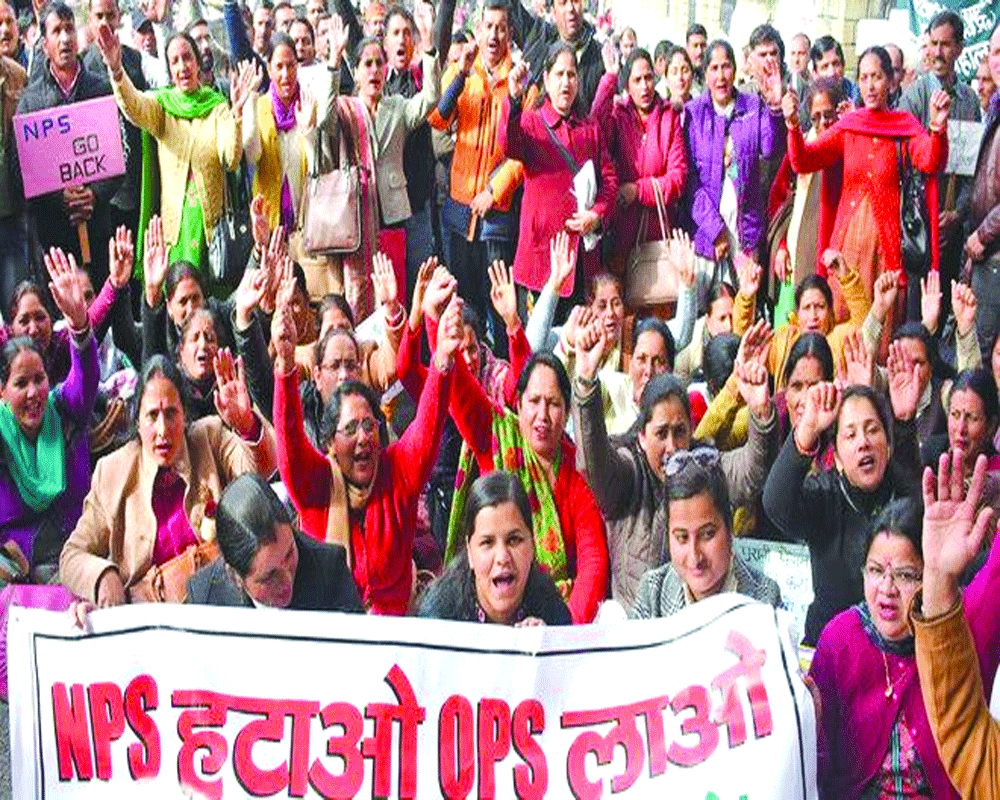As elections to certain Assemblies approach, the controversy over the pension schemes is simmering the poll cauldron as retirement benefits debate rages
Come elections and the demand of reviving the old pension scheme (OPS) has again taken centre stage. Thousands of employees in Kangra district of Himachal Pradesh hit the streets and organised their march to Dharamsala Secretariat demanding OPS implementation. The employees warned the Government that ‘Mission Repeat’ would not be possible if their demand for old pension is not accepted. Kangra district is not only the biggest district of the State, but also one of the politically most important districts. It sends 15 MLAs to the Assembly. During the last Assembly session, Himachal Government employees under the banner of New Pension Scheme Karamchari Mahasangh (NPSKM) staged similar agitation outside the Assembly complex in Shimla. The employees recruited after 2004 in Himachal Pradesh were not entitled to the OPS. They are being given NPS, which was a form of contributory pension. Financial experts have warned that if the State decides to implement the OPS, it will put a financial burden of `4,000 crore. In a game of political oneupmanship, the Congress has already announced that if voted to power, it will implement OPS.
The agitations on the issue of old verses new pension policy seem to be fast picking up in the entire country. The Rajasthan Government set the ball rolling when Chief Minister Ashok Gehlot in his budget speech in Feburary 2022 proposed to go back to old pension scheme for State Government employees appointed after January 1, 2004. The elections to the Assemblies of both States are scheduled for this year. During canvassing for the elections, the Samajwadi Party (SP) had proposed a similar move if voted to power in Uttar Pradesh. There are indications that something similar is being contemplated in Chhattisgarh. Such populist moves may seem to be politically expedient in near future but considering the current environment of economic uncertainty, it would prove disastrous in the times to come.
The challenge is not confined to India. The entire world is facing the crisis of funding of Defined Pension Benefit Sheme (DPBS), which guarantees a pension on retirement. As the old live longer and retirees live even longer because they can afford better diets, healthy lifestyle and world class medical care, the demographic transitions reduce the number of young to pay for the old. The main question is whether States with limited fiscal resources at their disposal can provide for such a scheme? Certainly not. According to budget estimates, the debt of State Governments has risen from 26.3 per cent of GDP in 2019-20 to 31.2 per cent in 2021-22. Let us take the example of Rajasthan. The current number of pensioners/family pensioners in Rajasthan is about 5.6 lakh. This number will increase by about 30,000 each year up to the late 2030s. The Government spent about `23,000 crore on pensions in the current year and has made contributions of about `2329,000 crore to NPS. This expenditure will increase each year by at least 7.5 per cent up to 2030s. Other States also face the same situation.
The implementation of such populist scheme at the face of competing demands that range from the provision of health, education, public transport and infrastructural facilities to the masses is nothing, but suicidal. The decision of shifting back to OPS is illogical and devastating to the hardpressed economy. State Governments should think twice before giving in to such populist demands and implementing such schemes. It may be helpful in winning elections for the time being, but it’d have a deep impact on the States’ economy in future.
Prime Minister Narendra Modi-chaired Union Cabinet approved the National Education Policy 2020, making way for large-scale, transformational reforms in school and higher education sectors. The new policy aims to pave the way for transformational reforms in school and higher education systems. This policy has replaced the 34-year-old National Policy on Education (NPE), 1986. Built on the foundational pillars of Access, Equity, Quality, Affordability and Accountability, this policy is aligned to the 2030 Agenda for Sustainable Development and aims to transform India into a vibrant knowledge society and global knowledge superpower by making both school and college education holistic. The new policy talks about establishing a single regulator for higher education in the form of National Research Foundation which would ensure funding for outstanding peer-review research and to actively promote research in universities and colleges.
The Higher Education Institutions (HEIs) should be governed by highly qualified independent boards having academic and administrative autonomy that would ensure the appointment of competent and experienced faculty and fill up institutional leadership positions on merit. The NEP vision envisages moving towards a higher educational system consisting of large,multi-disciplinary universities and colleges with at least one in every district and with more HEIs across India that offer a medium of instruction or programs in local/Indian languages. It will ensure revamping of curriculum, pedagogy, assessment and student support for enhanced student experiences.
(The writer is a senior journalist and Chairman, Panwar Group of Institutions, Solan, Himachal Pradesh. The views expressed are personal.)


























